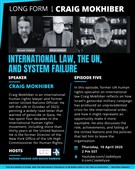National Conference - Students for Justice in Palestine
New York, 14-16 October, 2011
Dear Students,
It is with great pleasure that we invite you to the 2011 National Students for Justice in Palestine (SJP) Conference at Columbia University in the City of New York from 14-16 October 2011.
Over the past couple of months, a number of student activists from SJPs and other student groups focused on Palestine from around the country have been laying the foundations for a national SJP conference to be held in Fall 2011. This group emerged from a discussion which took place on the national SJP listserv and has met a number of times via teleconference. This letter is a summary of our work so far and an appeal for students nationwide to become involved in organising the conference.
Goals & Objectives
The objective of this conference is to democratically shape and refine the existing network of SJP groups in the United States, building on the momentum these groups have generated in recent years and strengthening the historical movement of which we are all a part. The proposed goals of the conference are as follows:
1. Movement Building: This conference aims to develop coordination and cooperation between different student groups working for justice in Palestine within the United States and to determine the nature and intensity of this coordination moving forward.
2. Campaign Building: This conference aims to facilitate and support the advancement of existing campaigns and the development of new campaigns with particular (but not exclusive) emphasis on Boycott, Divestment and Sanctions (BDS).
3. Political Development: This conference aims to stimulate thought and debate on a small number of critical political issues integral to the work of student groups working for justice in Palestine.
4. Skill Development: This conference aims to provide student groups with the tools and skills necessary to develop educational programs, plan and execute campaigns, and train their peers to better communicate with one another and with other members of the student body.
These goals reflect the critical issues that SJP groups will collectively address at this conference; the first is seen as the most crucial. These are proposed goals and we are eager to begin a national dialogue about these and other aspects of the conference (see below).
Committees
Six working groups have been proposed that will organize different components of the conference; they are listed below. It is critical that as many students from groups nationwide participate in these committees and contribute to shaping the conference. To join a committee, please email the address provided with your name, school, phone number, SJP group name, and the contact details of a leader of your SJP chapter (so that each organizer can be identified for security purposes). The coordinating committee will be restructured to include representatives from each of the other committees and regional representatives.
Coordinating – nsjp.coordinating@gmail.com
Programming – nsjp.programming@gmail.com
Press and public relations – nsjp.ppr@gmail.com
Fundraising and finance – nsjp.ff@gmail.com
Logistics - nsjp.logistics@gmail.com
Marketing/outreach - nsjp.outreach@gmail.com
Eligibility
This conference is specifically geared towards current student Palestine solidarity activists, including current students actively involved in, or looking to establish, a SJP group or a similar Palestine solidarity student group, as well as alumni actively involved in assisting their former SJP group. All alumni should be endorsed by the current student group. It is strongly suggested that at least one participant from each school be non-graduating and that alumni not outnumber students in any SJP`s delegation. It may become necessary, based on capacity and interest, to limit the number of representatives from each student group, but at this stage groups should look to send at least two delegates.
To succeed the planning of this conference needs to be a democratic process involving as many students as possible, and we hope you will become involved. We are confident that this conference will provide a momentous opportunity for students across the United States who are mobilizing for justice in Palestine to exchange ideas and to strengthen the national student movement.
Sincerely,
The Ad Hoc National SJP Conference Planning Committee
[Click here to see the full conference announcement and register for the conference.]
![[SJP logo. Image from conference announcement.]](https://kms.jadaliyya.com/Images/357x383xo/sjp.jpg)

















